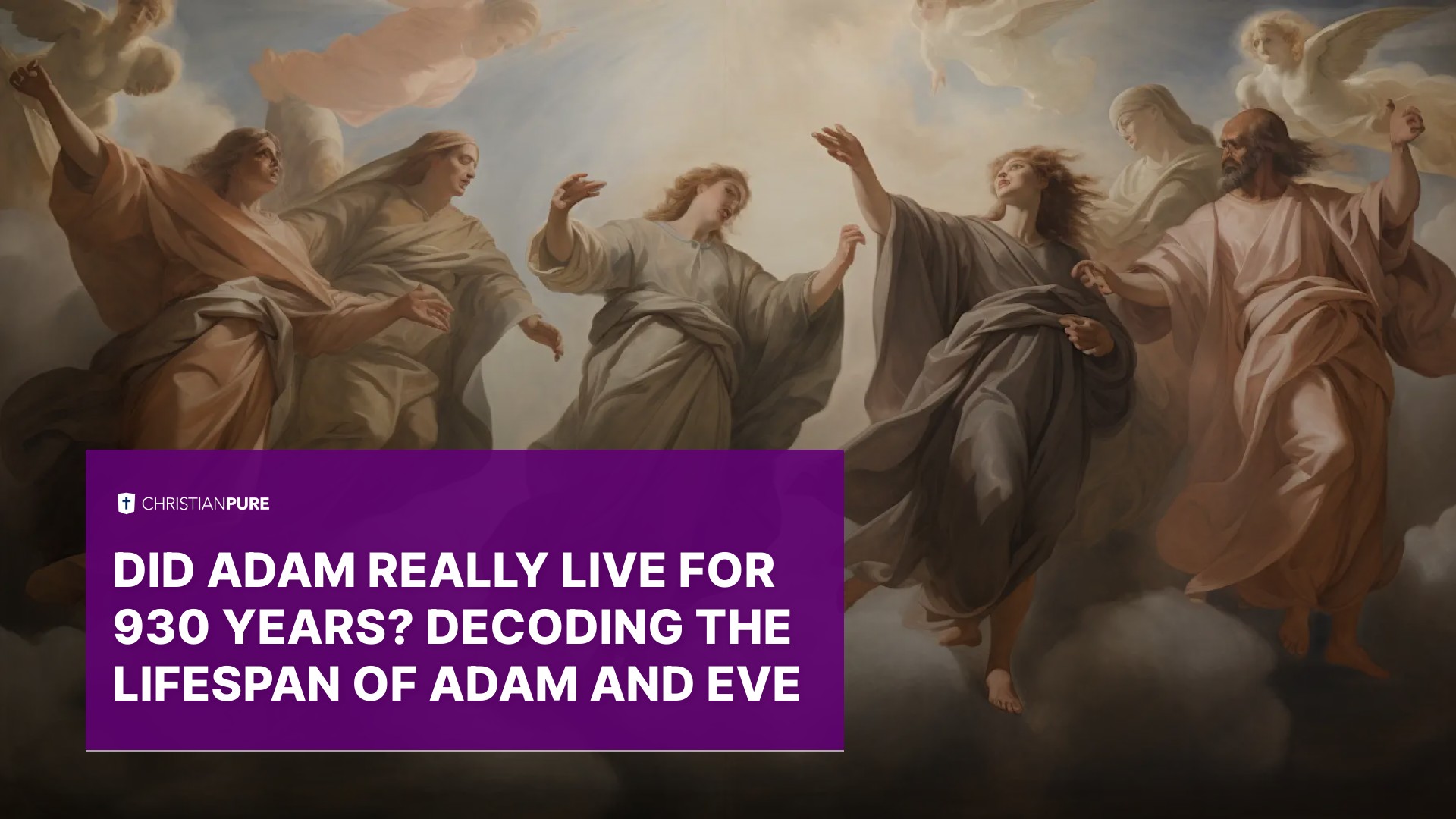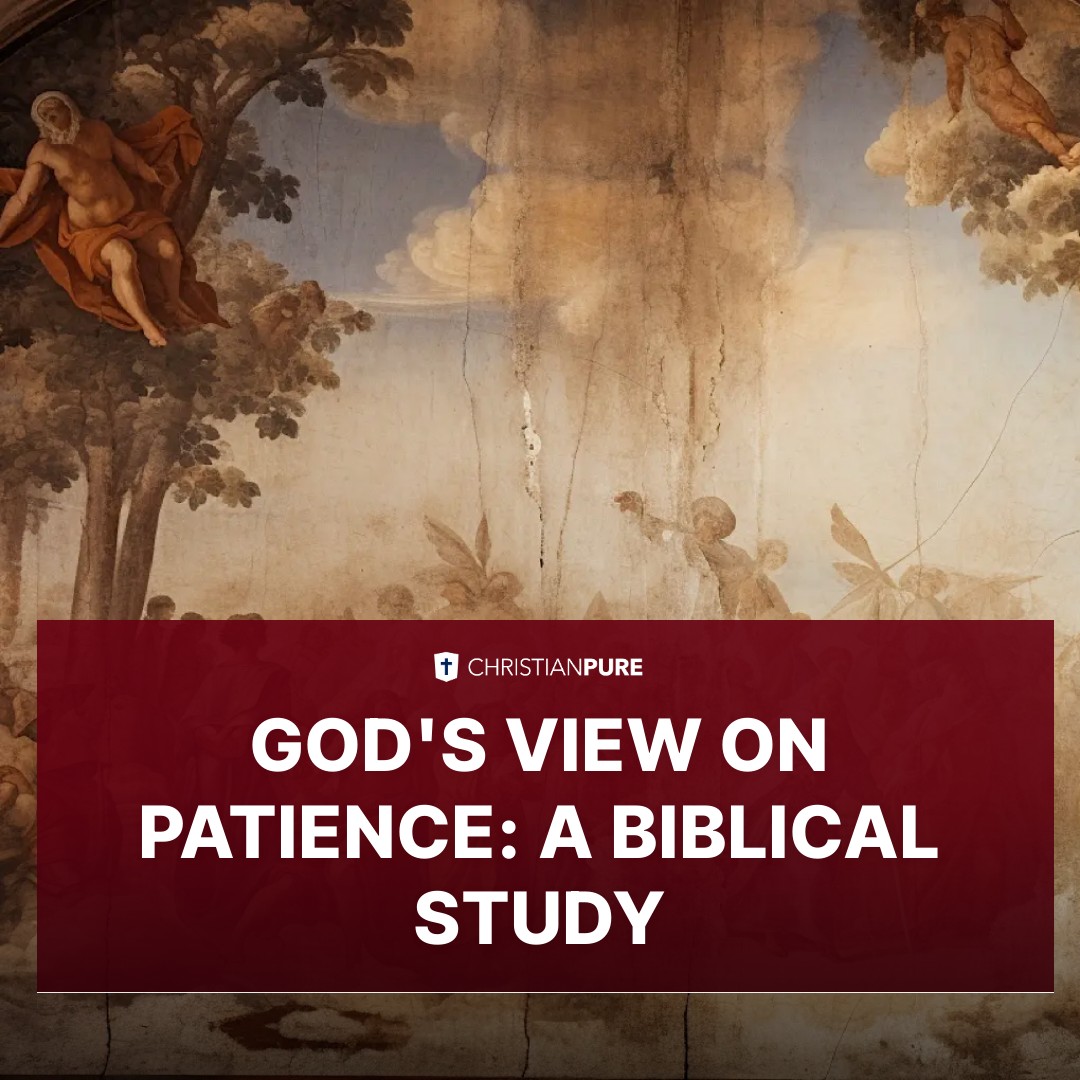How many years did Adam and Eve live according to the Bible?
According to the theological and historical text of the Bible, notably in Genesis, Adam lived a substantial life totaling 930 years. It's a number that astonishes us today, yet it appears quite simply and directly in the early chapters of Genesis, specifically Genesis 5:5, which says: "And all the days that Adam lived were nine hundred and thirty years: and he died".
When it comes to Eve, the Bible does not provide a specific number for her years of existence. Genesis 3:20 acknowledges Eve as "the mother of all the living," yet it does not furnish us with a definitive lifespan. Despite this, it is often speculated that she lived a lifespan similar to Adam's, as they were both created by God with the original intention of eternal life in a paradise on Earth, before sin entered the world.
These figures challenge our contemporary comprehension of human lifespan. They position Adam and Eve as individuals of great longevity, where such length of life seems extraordinary to our current-day understanding of biology and medicine.
Summary:
- Based on the textual evidence in the Bible, specifically Genesis 5:5, Adam lived for 930 years.
- The Bible does not provide a specific lifespan for Eve, yet it is speculated she also enjoyed a similarly lengthy life as Adam.
- Both Adam and Eve were initially created by God to live eternally in a perfect world; their significantly long lives are a notable reflection of this divine intention.
- Their extraordinary lifespans sit in contrast with our modern comprehension and expectations of human longevity.
Is there a specific age limit mentioned for Adam and Eve in the Bible?
We journey together, you and I, delving deep into the sacred texts of the Bible. On our quest for understanding, we come across the lifespans of our earliest ancestors, Adam and Eve. Nowhere in the sacred scripture is there a definite 'age limit' set for these two pivotal figures. Interesting to ponder, isn't it?
Adam's lifespan is recorded as 930 years in Genesis 5:5. "And all the days that Adam lived were nine hundred and thirty years: and he died." A startling number by today's standards indeed! And what about Eve? Her lifespan remains a mystery, with the Bible staying silent on this matter. However, as she was created to be a companion for Adam, many scholars argue that she would have likely lived a similar length of time.
Why so long, perhaps you ask? The answer could lie in their initial state of purity and perfection, being directly created by God, free of the imperfections and degradation that would come later following their fall from grace. Another enlightening thought is that the absence of an 'age limit', as we understand it today, reflects the original intention for humanity—to live forever in a state of perfect unity with God, only interrupted by the consequences of sin.
Yearning for illumination on this notion becomes clearer as we recall that God had only declared a specific 'age limit' or lifespan for humans following the Flood, stating in Genesis 6:3 that man's days would be 120 years.
In essence, the specifics of an 'age limit' for Adam and Eve remain opaque, the narrative emphasizing instead the profound theological concepts of humanity's potential for eternal life and the disruptive effects of sin.
To summarize:
- There isn't a stipulated 'age limit' for Adam and Eve in the Bible. Adam lived to be 930 years old, but the lifespan of Eve is not mentioned.
- The considerable lifespan of Adam can be attributed to the initial state of purity and perfection since Adam and Eve were direct creations of God.
- The concept of an 'age limit' akin to our understanding didn't exist then, reflecting God's original plan for human beings to live in eternal communion with Him.
- Declaring a specific 'age limit' only occurs later, in Genesis 6:3, where God states that man's lifespan would be 120 years.
What is the Catholic Church's stance on Adam and Eve's long lifespan?
The Catholic Church, known for delving deeply into theological interpretation, holds an interesting position when it comes to the remarkable lifespan cited for Adam and Eve in the Scriptures. The Church emphasizes the importance of understanding these extraordinarily long lives not only from a literal perspective but also from a symbolic one.
From a literal viewpoint, one could say that Adam and Eve, in their original state of sanctity and grace, were free from sickness, sorrow, and death. Their bodies, made in the likeness of God and untouched by sin at creation, were meant to enjoy eternal life in the earthly paradise. Hence, the fantastic ages of Adam and Eve - over 900 years - might represent this original destiny from which mankind strayed due to sin.
However, the Catholic Church also invites us, the faithful, to consider a more symbolic interpretation. It encourages the view that these extraordinary lifetimes represent the thematic continuity between the original human couple and the generations that followed. In other words, the seemingly impossible ages might signify the ongoing Divine presence and guidance throughout the human history, even in the Face of Sin.
Yet, even within the Church, these interpretations aren't universally agreed upon. Opinions vary, but the consensus tends that the age of Adam and Eve, as given by Scriptures, are less about specific years and more about the essential role they played in the grand narrative of salvation history.
To summarize:
- The Catholic Church values both literal and symbolic interpretations of Adam and Eve's exceptional lifespans.
- From a literal perspective, their long life could represent the original, sinless state of humanity meant for immortality.
- Symbolically, their impressive age might indicate the continuing Divine presence and guidance in human history, despite sin.
- However, the Church stresses focusing less on specific years and more on their central role in the salvation history.
What factors contributed to Adam and Eve's long lifespan?
Who can truly say why steeped in the mists of antiquity, our forebears, Adam and Eve, and indeed their early descendants, were bequeathed such extraordinary lifespan? According to the holy scripture, Adam lived a staggering 930 years, with his progeny and other biblical patriarchs reaching similar epochs of life. To our modern sensibilities, this seems beyond the realm of the conceivable, yet we find ourselves seeking explanations within the nexus of historical, ecological, and genetic contexts.
We'd be hard-pressed to ignore the evident correlation set forth in Genesis that the pre-Flood populace, of whom Adam and Eve were the vanguard, exhibited systematically longer lifetimes. One intriguing conjecture points to genetics as a critical component. Accumulated wisdom from lab experiments, particularly on lesser organisms like worms and fruit flies, supports a certain plausibility: that longevity can indeed be manipulated through simple genetic switches. Could it be then that Adam, Eve, and their immediate lineage inherited such exceptional genetic predilections for lengthened lifespans?
There exist other theories, too, laden with equally compelling possibilities. Could Adam and Eve's original, wholly vegetarian diet have contributed significantly to their longevity, as cited by some scholars? Perhaps the robustness of these early pioneers can be attributed instead to starkly different environmental conditions; after all, the early chapters of Genesis paint a picture of Eden as being a more benign, less disease-ridden world than we know today.
It's fascinating to contemplate, isn't it, how a confluence of such factors might have conspired to foster these prolonged lifespans? However, while we can hypothesize about Adam and Eve's ripe old ages and their descendants' similar longevity, truth be told, we may never be certain of the precise reasons behind this biblical phenomenon. Herein lies the enigma, one that engenders endless debate and offers tantalizing glimpses into our ancient past.
To summarize:
- Genetic factors could have played a crucial role in the extended lifespans of Adam and Eve as well as their direct descendants.
- Adam and Eve's original vegetarian diet, as noted in Genesis 1:29, might have substantially contributed to their longevity.
- The markedly different environmental landscape of Eden, presumably less riddled with diseases, could have contributed to longer life spans.
- While these reasons provide intriguing possibilities, the precise factors contributing to Adam and Eve's long lives remain a subject of continued discussion and research.
Why did Adam and Eve live longer than humans today?
Why did our earliest ancestors - Adam and Eve - live lives remarkably longer than us, their distant descendants? This question captures our collective curiosity and enters the realm of deep theological pondering.
We must remember that Adam and Eve were created in a world untouched by sin - a perfect paradise, intended for them to live in forever. Following this school of thought, it is not surprising that their lifespans exceeded our traditional understanding. Isn't it natural for a perfect being in a perfect world to live extraordinarily long lives?
Moreover, some scholars have hypothesized that the vegetarian diet that Adam and Eve followed, as outlined in Genesis 1:29 of the Bible, may have contributed to their prolonged life span. A diet free from meat, filled with pure fruits and vegetables untainted by modern pollutants, might have held the key to longevity.
Beyond their diet, early mankind arguably evaded most of the health challenges that modern-day humans face. They lived in a pristine environment absent from the disease, pollution, stress, and unhealthy lifestyle choices that often characterize our lives today.
Finally, it's worth noting that these extraordinary lifespans weren't limited to Adam and Eve. Other figures such as Noah and Methuselah also had lengthy sojourns on Earth. This pattern suggests a broader Divine plan, with longevity inherently sewn into the universe's original blueprint.
However, we must remember that these explanations remain speculative, grounded in interpretations and inferences derived from Scripture. Ultimately, the exact reasons behind the prolonged lives of early humans remain a secret hidden in the sacred and timeless divine narrative.
To summarize:
- Adam and Eve, created in a perfect world untouched by sin, were intended to live indefinitely, which might explain their extraordinary lifespans.
- The vegetarian diet followed by Adam and Eve could be a plausible factor; fresh, unprocessed food might have played a role in enabling their longevity.
- The lack of modern illnesses, stress, pollution, and other detrimental factors in their lives may have contributed to their prolonged lives.
- The pattern of long life spans was noted in other biblical personalities like Noah and Methuselah, suggesting a broader divine plan.
- Ultimately, these explanations remain speculative, and the exact reasons for the elongated lives of early humans are part of the divine mystery.
Did Adam really live for 930 years as stated in the Bible?
We understand, dear reader, that the numbers provided in Genesis - that Adam lived to be 930 years old - may provoke thoughts of skepticism, awe, and bewilderment. Indeed, it is a vastly significant lifespan compared to the current human average. Yet, ambling through the annals of biblical time, we find this to be a common theme among the forebears of humanity.
Adam, as the first man created by God, stands as a poignant figure in the narrative of mankind's history. His age, denoted as 930 years old at his death, is a specific detail mentioned in the Bible, specifically in Genesis 5:5. It is less a figure of speech, and more a stated fact, at least within the context of the sacred texts. However, the interpretation of this fact across different perspectives varies.
From a literalist view, such a lifespan is accepted as written - a testament to the robustness of early humans, molded by divine hands. These believers adhere to the idea that God's first creations were perfect in every aspect, including their health and longevity.
From a symbolic perspective, some scholars suggest this great age symbolizes Adam's importance or virtue. Ancient cultures often attributed long lifespans to their heroes, wise men, and significant figures as a sign of their greatness.
From a scientific perspective, however, such longevity remains unexplained, steeped in the mystery of pristorical times and the evolution of human biology.
As we contemplate over these diverse perspectives, let us embrace the complexity and depth of our history, both as seen through the lens of faith and that of scientific exploration. The longevity of Adam, whether literal or symbolic, challenges our understanding and invites us to explore the deeper questions about human life, its purpose, and its ultimate origin.
To summarize:
- Adam, as stated in Genesis, lived for 930 years.
- These long lifespans are common among the early figures in the Bible.
- Interpretations of these long lifespans vary considerably, ranging from literal acceptance to symbolic interpretation.
- From a scientific point of view, these long lifespans remain unexplained.
- The question of Adam's longevity invites deeper contemplation about life and our origins.
Why did God decide to shorten the human life span?
In the grand narrative of the Bible, one theological perspective posits that the shortening of life expectancy was a merciful act of God to limit the expansion of human sin. When sin entered the world through Adam and Eve, humanity's perfect existence was marred. Sin brought death into the world, as affirmed in Romans 5:12 "Therefore, just as sin came into the world through one man, and death through sin...". It is the impact of this sin that we see as a major reason for the decrease in lifespan.
Have you ever wondered about a world where evil regimes could perpetuate indefinitely? The descendants of Adam and Eve, possessing the same proclivity toward sin, could potentially have established powerful regimes that lasted centuries if their lifespans had not been shortened. Consider the possibilities if individuals like Hitler, Stalin, or Mao Zedong lived for hundreds of years. Within this perspective, the reduction of human lifespan is thus seen as a mercy rather than a punishment, an act to limit the extent of evil in our world.
The Bible also introduces the concept of mortality to encourage us to seek the divine. The brevity of life suggests the necessity of taking hold of God, Christ, and the gospel. As stated in Psalm 90:12, "Teach us to number our days, that we may gain a heart of wisdom." . Here, human mortality reminds us of our dependence on God, urging us to use our limited time wisely.
To conclude, the reason for the lowering of mankind's lifespan can be traced back to the entrance of sin and God's subsequent actions. The theological implications suggest it was not merely a divine punishment, but also an act of merciful restraint and an incentive for humanity to pursue a deeper relationship with the divine.
- The shortening of lifespan is perceived within the Bible as a consequence of human sin.
- The act of limiting human lifespan can be viewed as divine mercy, restricting the extent of human evil.
- A shorter lifespan acts as a prompt for humans to seek God and live a purposeful life.
- The decrease in human lifespan is intrinsically tied to the consequences of sin and God's love for His creation.
Did Eve live as long as Adam according to the Bible?
According to the biblical account, the lifespan of Eve—the first woman—remains somewhat of a mystery. While the Bible takes care to catalog the years of Adam, Seth, Methuselah, and many other patriarchs in meticulous detail, it does not specify a definitive age for Eve at the time of her passing. This omission has sparked considerable speculation and debate among scholars, theologians, and the faithful alike, with interpretations varying widely based on cultural, historical, and linguistic considerations.
Nonetheless, there are reasons to believe that Eve may have lived for a remarkably long time, comparable to her husband Adam. After all, she was, like Adam, formed directly by the hand of God and placed in the pre-sin world of Eden. This status could potentially have bestowed upon her a similar lifespan as Adam, who lived until the ripe age of 930 years.
Yet, without unequivocal biblical evidence, any assertions about Eve's age at death remain conjectural. A sense of humility is warranted in our curiosity, reminding ourselves that while longevity holds a certain fascination, it's the strength of spirit and moral character that truly define a life's worth, rather than its numerical duration. And in this, Adam and Eve stand as profound symbols, their long lives serving as stark reminders of our own mortality and the impermanence of earthly existence.
Summary:
- The Bible does not specify the exact age of Eve at her death.
- Eve, being directly created by God and living in the pre-sin world, may have had a lifespan similar to Adam's.
- Without concrete biblical evidence, the precise length of Eve's life remains speculative.
- Despite this, both Adam and Eve's long assumed lives remind us of our own mortality and the fleeting nature of earthly life.
What are the theories behind the long lifespans of biblical figures like Adam and Eve?
We hold the belief, as purveyors of sacred texts, that faith doesn't operate exclusively within the domain of the tangible or the verified. It also dwells in the realm of the unproven, the awe-inspiring mystery that unfolds itself in whispers and hints. Did these biblical figures live significantly extensive lives, as the Bible tells us? The substantiation we seek isn't purely empirical, but a combination of faith, speculation, and spiritual insight.
Ruminating upon the patriarchs’ extraordinarily long lifespans, numerous theories and interpretations have been proposed, yet none hold an exclusive claim to the truth. Some scholars, leaning upon Genesis 1:29, assert that the original vegetarian diet enabled people to live to advanced ages. This interpretation alludes to a healthier lifestyle complemented by an optimal diet, both of which could ostensibly contribute to extended lifespan.
Other theories delve more into genetic attributes. The permutation and variation of genes are known, as reinforced by various studies in modern biology, to impact longevity. Portraying similar hypothesis, proponents argue that pre-Flood ancestors might have possessed unique genetic qualities beneficial for long life.
Furthermore, certain theologians speculate that in the genesis of creation, before sin tainted the world, death did not exist. It was a foreign concept, an alien intrusion, only introduced as a consequence for disobedience. The long lifespans of Adam, Eve, and their descendants might be reflective of this primordial perfection and absence of death.
As you can see, the exploration of human longevity in the Bible is a voyage into a complex matrix of diet, genetics, and spiritual belief. A windswept landscape of religious speculation, scientific conjecture, and historiographical investigation. But isn't that what makes the journey of faith so profound and personally edifying?
To summarize:
- The long lifespans of Adam, Eve, and other biblical figures stimulate a variety of theories.
- One theory proposes an original vegetarian diet, as suggested by Genesis 1:29, as a significant factor to their lengthy lives.
- Others consider genetic factors, imagining a possible pre-Flood genetic quality favorable for extended lifespan.
- A spiritual perspective suggests the absence of death in the early perfect creation, with long lifespans reflecting this lack of mortality.
- These speculations combine to form a multifaceted exploration of biblical longevity, incorporating health, heredity, and theological insight.
Are there other biblical figures who lived as long as Adam and Eve?
In the pages of the Bible, the longevity granted to Adam and Eve is not exclusive. There are indeed other biblical figures who lived extraordinarily long lives, particularly those mentioned before the occurrence of the Great Flood. This longevity is given particular emphasis in the early chapters of Genesis.
Consider Seth, the child of Adam and Eve. According to biblical records, Seth lived for 912 years. Enosh, a son of Seth, walked this earth for 905 years. Among these early descendants of Adam, there are individuals who lived even longer than Adam himself. Methuselah, for instance, holds the record with a lifespan reaching an astonishing 969 years. Noah, the man who withstood the Great Flood, lived for no less than 950 years.
While the Bible does not provide explicit reasons for these long lifespans, it allows us to contemplate on the profound themes of life, creation, disobedience, and death. These central elements of human existence resonates throughout the narrative of Genesis, offering us profound insights into the spiritual foundations of our lives.
The death we sense and experience was not part of God's original design for humanity. It was only after sin entered the world that it became an integral part of our reality. This disconnection from the perfect design can lead us to further introspection about the nature of sin, punishment, and the potential for redemption.
The longevity, as seen in the ages of these patriarchs, served an important purpose. It laid the groundwork for the preservation and transmission of divine revelation from Adam to Lamech, father of Noah, who survived the flood, ensuring the continuity of humanity amidst divine judgement. The long lives of these early biblical figures provide a window into the tapestry of human history as we seek to make sense of our spiritual journey.
To summarize:
- Longevity was not confined to Adam and Eve. Other biblical patriarchs, like Seth, Enosh, Methuselah, and Noah, also lived for several centuries.
- This extended lifespan, particularly witnessed in the early chapters of Genesis, is closely interwoven with the themes of life, creation, sin, and death.
- The Bible suggests that death was introduced into the world as a consequence of sin, but the longevity of these early figures allowed for the transmission of divine revelation from Adam to Noah's father, Lamech.
Is there a scientific explanation for the long lifespan of Adam and Eve?
Biologically, longevity is principally determined by genetics. We might infer from this that Adam, Eve, and their descendants carried a unique genetic configuration that fostered greater lifespans. Studies conducted on fruit flies and worms indicate that longevity can indeed be altered through genetic factors. A genetic switch for longevity has been identified in certain worm species, and it stands to reason that a similar element could have existed in these biblical figures.
The pre-Flood era, during which Adam and Eve are believed to have existed, exhibits a systematic pattern of long life spans. From Adam's 930 years to Noah's impressive 950-year lifespan, biblical mention of longevity is frequent. This has led some to suggest that the environmental conditions pre-Flood were considerably different, possibly contributing to increased lifespans.
On the theological front, one popular interpretation roots itself in Genesis 1:29, which indicates that the original diet of the first human beings was vegetarian. Certain theologians suggest that this type of diet, perhaps combined with a more balanced lifestyle and different environmental factors, assisted in the extended lifespans of the era.
In Daniel 1:8-16, we encounter the story of Daniel requesting a vegetarian diet. Nourished by the plant-based bounty nature bestowed upon them, those of biblical times such as Daniel, and presumably Adam and Eve, likely led healthier lives, which could indeed explain their biblical longevity. Were they closer to a perfect world than us? Is there something missing in our contemporary lives?
We must also consider the shift in dietary habits after the Great Flood. With the varieties of plants drastically reduced, humans may have been forced or permitted to consume meat. This significant change in diet could have potentially affected their lifespans. As members of the human race, does this change in diet resonate with us today?
The Biblical narrative suggests that, initially, mortality was not part of the divine plan. When sin entered the world, death became part of creation as a punishment for disobedience. Is it possible, then, that early mankind's lengthy lifespans were simply a vestige of a nearly perfect world free of sin?
The concept of genetic longevity factors also rises to the surface. This theory suggests an intriguing possibility: the pre-Flood ancestors might have had a stronger genetic makeup that allowed extended lifespans. As we delve into our shared human history, may we also examine our current level of genetic inheritance?
To summarize:
- Living longer lives might have been influenced by healthier plant-based diets and better balanced lifestyles during the early biblical era.
- Dietary shifts after the Great Flood, perhaps including meat consumption, might have impacted human lifespans.
- Early mankind's long lifespan could be viewed as a remnant of a nearly perfect world sans sin before death became a consequence of disobedience.
- Pre-Flood ancestors might have benefited from stronger genetic longevity factors leading to extended lifespans.
Facts & Stats
Adam is said to have lived for 930 years according to the Book of Genesis.
Eve's age is not mentioned in the Bible, making it difficult to determine her lifespan.
The average human lifespan today is approximately 72.6 years according to the World Health Organization.
After the biblical flood, God reportedly set human lifespan to a maximum of 120 years.
The average lifespan in the Bronze Age, which is roughly when Adam and Eve would have lived if they were historical figures, was around 26 years.
The Bible suggests that early humans lived much longer lives, with Methuselah reported as living 969 years.
The decrease in biblical lifespans over time, from hundreds of years to the current average, is not explained scientifically.
References
Genesis 2:17
Genesis 5:5





















